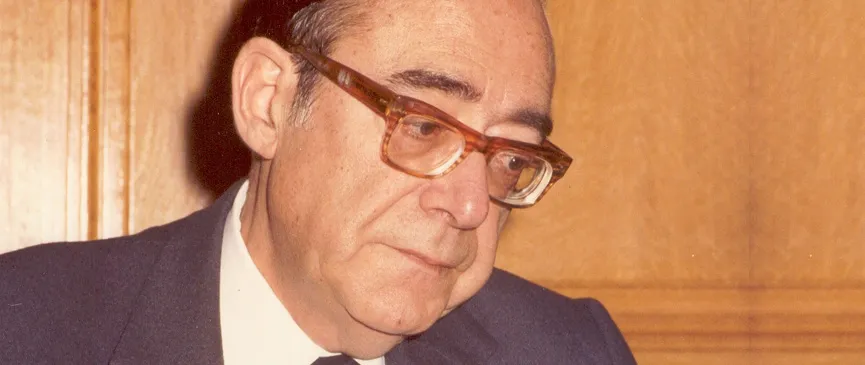Main content
Horacio Saénz Guerrero Prince of Asturias Award for Communication and Humanities 1988

Horacio Sáenz Guerrero (Logroño, Spain, 1921 - Denia, Alicante, Spain, 1999), the narrator, witness and interpreter of many years of Spanish and international daily history, he would recall that he was a frustrated doctor due to the circumstances of the Forties, he was won over, however, by a liking for journalism in its widest form, including sports writing.
He entered La Vanguardia Española, as an unpaid trainee, on the 16th October 1942, when he was twenty years old and had just graduated from the Madrid School of Journalism. When, in 1981, he prepared the commemoration of the centenary of the newspaper, which had been born under the name La Vanguardia, Sáenz Guerrero withdrew the adjective "Española", which had been imposed upon the paper in January 1939 to allow it to continue being published. He began his literary career working as a literary critic and copy writer, later being placed in charge of the sections of local and provincial comment, and film and theatre reviews. He was also the head of page-setting, writer, chief editor of domestic news and was finally made sub-director in January 1961.
Sáenz Guerrero has worked in all varieties of journalism and has contributed in different media, including the magazine Destino, Radio Nacional de España and the early years of television. He was also a correspondent for Time Life and The New York Times.
In 1952 he took part in the foundation of the Barcelona School of Journalism, of which he was appointed secretary and lecturer in Typography and Page Design.
He subsequently began his period as a special correspondent. As such he lived in the United States, the Middle East, Germany, Italy, Bolivia, India and Japan. Back in a more sedentary occupation, he was appointed director of La Vanguardia on the 20th October 1969.
In June 1978 he obtained the IV Journalism Prize of the Catalan Circle in Madrid, for his article "Cataluña, vehículo mundial de la cultura castellana," published in the "Hoja de Lunes" of the 24th April that year. In September 1981, the EFE agency granted him the prize for the best reporting work of 1980, the year Catalonia gained its autonomy. "Objectivity," he declared upon receiving the award, "is a controversial issue. But I have tried to inform, attempting to keep the paper I run on the margin of any kind of struggle and always at the service of intelligent understanding by all Spaniards." Making this declaration into a reality, he has been an agent of the first order, working from Catalonia, in achieving a clean democratic transition and bringing back liberty.
He left the management of La Vanguardia on the 1st January 1983. He was a member of the newspaper´s board of management, and published a weekly column which enjoys great prestige. He also wrote a section entitled "Carta de Situación", which closes the newspaper´s Sunday magazine. He participated in the programme "Protagonistas" of the COPE radio station.
In 1988, he published Fuego sin sangre.
On the 6th May 1987, he was awarded the "Mariano de Cavia" Award, the most prestigious recognition in Spanish journalism, for an article entitled "Descubrimiento, palabra nefanda". In December 1987, the Catalan Regional Government, the "Generalitat", awarded him the Cross of St. George for the quality of his output of literary and political journalism, and in recognition of his constant defence, in running La Vanguardia, of democratic values, liberty and of Catalonia as a deciding factor nationally. In this task he has worked untiringly for fifteen hours a day during twenty years. Sáenz Guerrero was also the spokesman of the Juan March Foundation and was a member of the Academy of Gastronomy.
End of main content
